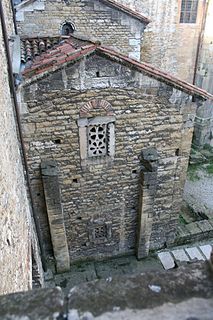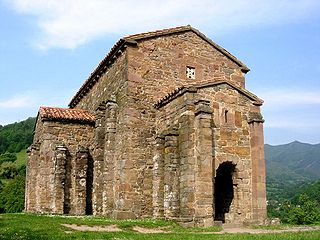 W
WThe Holy chamber of Oviedo is a Roman Catholic pre-Romanesque church in Oviedo, Spain, built next to pre-romanesque Tower of San Miguel of the city's cathedral. Nowadays, the church occupies the angle between the south arm of the cathedral transept and a side of the cloister.
 W
WSanta Cruz is a Pre-Romanesque Roman Catholic church located in Cangas de Onís, in Asturias, Spain.
 W
WSaint Peter of Nora is a Roman Catholic Pre-Romanesque church, located in Las Regueras, Asturias, Spain, beside the Nora river, about 12 km from Oviedo. The church is recorded for the first time in a donation document of Alfonso III of Asturias in 905.
 W
WHoly Saviour of Priesca is a Roman Catholic pre-romanesque church, located in Priesca, next to Villaviciosa, Asturias, northern Spain. Only a few kilometres from the Church of San Salvador de Valdediós, it is amongst the latest examples of Asturian architecture.
 W
WSt. Mary of Bendones is an Asturian Pre-Romanesque Roman Catholic church situated in Bendones, Spain, build between 792 and 842.
 W
WSt. John Apostle and Evangelist is a Roman Catholic Asturian pre-Romanesque church situated in Santianes de Pravia, northern Spain.
 W
WSan Julián de los Prados, also known as Santullano, is a Pre-Ramirense church from the beginning of the 9th century in Oviedo, the capital city of the Principality of Asturias, Spain. It is one of the greatest works of Asturian art and was declared an Historical-Artistic Monument by the Spanish Ministry of Culture in June 1917 and a World Heritage Site by UNESCO on 2 December 1998.
 W
WSt. Michael of Lillo is a Roman Catholic church built on the Naranco mount, near the Church of Santa María del Naranco in Asturias. It was completed in 842 and it was consecrated by Ramiro I of Asturias and his wife Paterna in the year 848. It was originally dedicated to St. Mary until this worship passed to the nearby palace in the 12th century, leaving this church dedicated to Saint Michael. It has been a UNESCO World Heritage Site since 1985.
 W
WThe church of the Holy Savior of Valdediós is a Roman Catholic pre-romanesque church, located next to Villaviciosa, Asturias, Spain.
 W
WSt Christine of Lena is a Roman Catholic Asturian pre-Romanesque church located in the Lena municipality, about 25 km south of Oviedo, Spain, on an old Roman road that joined the lands of the plateau with Asturias.
 W
WSanta Cruz de Cangas de Onís is a small Roman Catholic chapel in Cangas de Onís, the first capital of the Kingdom of Asturias, in what is now northern Spain. It was founded on an artificial mound by Favila, second king of Asturias, and his queen, Froiliuba. It was begun in 737 and consecrated that same year on 27 October according to its original foundation stone, which has been called the first literary monument of the Reconquista.
 W
WThe church of St Mary at Mount Naranco is a pre-Romanesque Asturian building on the slope of Mount Naranco situated 3 kilometres (1.9 mi) from Oviedo, northern Spain. Ramiro I of Asturias ordered it to be built as a royal palace, part of a larger complex that also incorporated the nearby church of San Miguel de Lillo, 100 meters away. The palace was completed in 842 and had in part a religious function, being consecrated in 848. Its structural features, such as the barrel vault—with transverse ribs corresponding one-to-one with contraforts at the exterior, make it a clear precursor of the Romanesque construction. The exterior decorations, as well as the use of stilted arches mark the intended verticality of the composition.